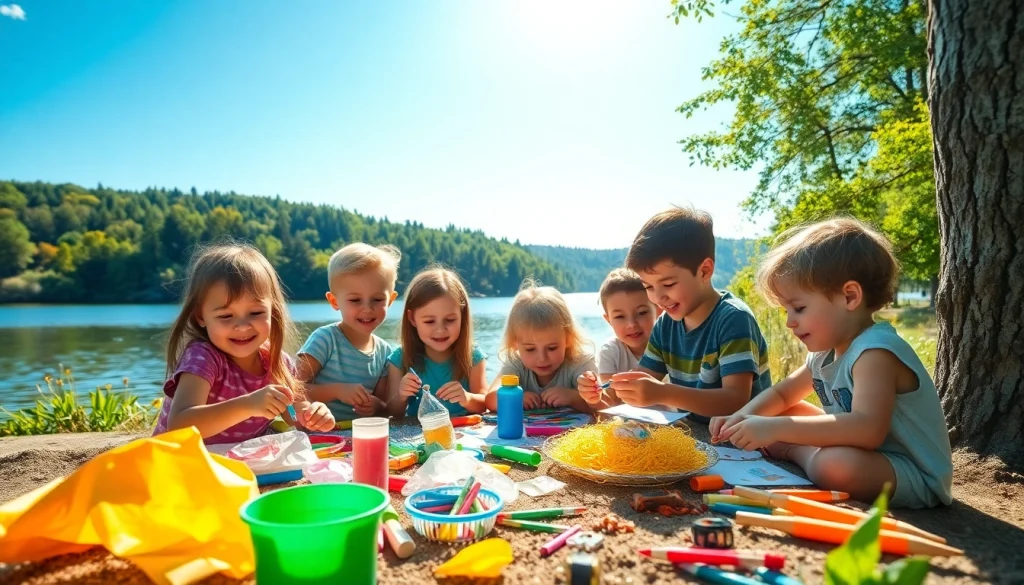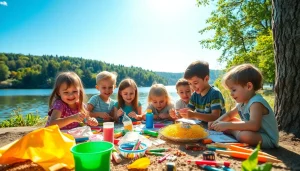Unforgettable Experiences Await at Exciting Holiday Camps for Kids

Introduction to Holiday Camps
Holiday camps have long been a popular option for families looking for ways to entertain and educate their children during school breaks. These camps provide a variety of engaging activities, facilitating fun and memorable experiences. Parents often seek out holiday camps that not only provide childcare but also promote physical activity, creativity, and social interactions among kids. This article will delve into the essentials of holiday camps, discussing the benefits, types, and factors to consider when selecting the perfect camp for your child.
What Are Holiday Camps?
Holiday camps are structured programs usually designed for children and adolescents that take place during vacation times such as summer breaks, winter holidays, and spring breaks. Typically, these camps are held at dedicated locations, ranging from community centers to remote outdoor terrains. They aim to provide organized, short-term activities, which might include sports, arts and crafts, adventure challenges, and educational workshops.
The Popularity of Holiday Camps
The allure of holiday camps lies in their ability to create a fun, safe, and enriching environment for kids. They offer a break from the digital world, encouraging outdoor play, teamwork, and the development of new skills. According to recent data, the holiday camp industry has expanded significantly in recent years, with parents increasingly recognizing the benefits of structured programs for their children. Camps such as those offered by the YMCA feature themed activities and nature exploration, elevating their appeal.
Different Types of Holiday Camps Available
Holiday camps can be broadly categorized based on their focus and activities. Here are some common types:
- Adventure Camps: These camps emphasize physical activities such as hiking, climbing, and exploring nature.
- Sports Camps: Focusing on specific sports, these camps enhance skills and promote teamwork and fitness.
- Arts Camps: These programs focus on creative pursuits like painting, writing, and performing arts.
- STEM Camps: Science, Technology, Engineering, and Mathematics (STEM) camps inspire children to explore creativity through scientific inquiry and hands-on learning.
- Day Camps: Typically run during the day, these camps allow children to return home each evening while engaging in diverse activities.
- Residential Camps: These camps provide lodging on-site, allowing campers to immerse themselves fully in the camp experience.
Benefits of Attending Holiday Camps
Enrolling your child in a holiday camp can yield numerous benefits, ranging from social skills development to stimulating creativity. Below, we explore some of the most significant advantages.
Social Skills Development at Holiday Camps
One of the key benefits of attending holiday camps is the opportunity for children to socialize and build their interpersonal skills. Camps facilitate interactions among peers, helping kids learn to communicate effectively, share, collaborate in teams, and resolve conflicts. As children engage in group activities, they develop empathy and a sense of belonging—skills crucial for later social dynamics.
Physical and Mental Health Boosts
Holiday camps promote physical activity, which is essential for maintaining a healthy lifestyle. Activities like sports, hiking, and outdoor games encourage children to be active, gradually imbuing them with a routine that prioritizes wellness. Additionally, the joyful experiences at holiday camps can significantly reduce stress and anxiety, helping children cultivate a positive and resilient mindset.
Encouraging Creativity and Independence
Camps often emphasize creative pursuits, allowing children to explore various art forms and activities, enhancing their imagination. Workshops in painting, music, dance, or creative writing can uncover hidden talents and foster a lifelong appreciation for the arts. Furthermore, staying away from home, whether overnight or during the day, helps instill a sense of independence in children, teaching them how to navigate challenges on their own while gaining confidence in their abilities.
Choosing the Right Holiday Camp
Finding an appropriate holiday camp can be a daunting task given the sheer number of options available. This section outlines key factors to consider when making your decision.
Factors to Consider When Selecting Holiday Camps
When evaluating holiday camps, consider the following aspects:
- Goals of the Camp: Identify the focus of the camp and ensure it aligns with your child’s interests—whether academic, athletic, or artistic.
- Staff Qualifications: Investigate the experience and training of the camp staff; trained counselors ensure a safe and nurturing environment.
- Safety Standards: Check what safety protocols are in place, including emergency procedures and health guidelines.
- Inclusivity: Look for camps that accommodate children of various backgrounds and abilities, promoting diversity and equal opportunity for all participants.
Location and Accessibility of Holiday Camps
The location of a holiday camp plays a pivotal role in determining its convenience and accessibility. Camps situated closer to home can save time and create comfort for both parents and children. Moreover, assess transportation options and parking facilities if you choose a camp that requires travel. Familiarity with the surrounding area can also enhance your child’s sense of security during camp exploration.
Consulting Reviews and Ratings
Parents seeking the best holiday camps should consult reviews and ratings online. Websites featuring parent feedback, detailed descriptions of camp activities, and “day-in-the-life” experiences can provide insight into the real nature of the camp. Online forums and social media groups dedicated to parent discussions can be incredibly helpful in gathering collective wisdom about specific camps.
Activities Offered at Holiday Camps
A central aspect of the holiday camp experience is the array of exciting activities designed to engage and enrich participants. Below, we detail some popular activities you can expect.
Outdoor Adventures and Sports at Holiday Camps
Most holiday camps incorporate outdoor activities to promote healthy living and teamwork. Children often participate in sports such as soccer, basketball, or swimming, which are frequently complemented by adventure-oriented options, including hiking, canoeing, or zip-lining. These activities not only keep kids physically active but also foster collaboration among peers.
Arts, Crafts, and Educational Programs
Many camps include arts and crafts sessions, allowing children to express themselves creatively through various mediums. Art instruction can range from painting to sculpture to photography, ensuring each child finds a medium they enjoy. Additionally, educational programs tied to local geology, history, or ecology are often included, adding an enriching layer to the overall camp experience.
Special Events and Themed Days
To enhance the fun, many camps host special events or themed days. Whether organizing a talent show, color run, or scavenger hunt, these occasions provide excitement and memorable communal activities. Such events encourage collaboration, help develop leadership skills, and build camaraderie among children.
Preparing for Your Holiday Camp Experience
Preparation is key to ensuring a smooth holiday camp experience for both children and parents. The following tips will help you and your child get ready for this adventure.
What to Pack for Holiday Camps
Packing appropriately for a holiday camp is crucial. Generally, campers need to bring the following essentials:
- Comfortable clothing suitable for outdoor activities and weather conditions.
- Closed-toe shoes for safety during active play.
- A refillable water bottle to stay hydrated throughout the day.
- Sun protection like hats, sunglasses, and sunscreen.
- A personal item from home, such as a stuffed animal, to help ease homesickness.
- Any necessary medications, along with a clear note regarding administration to staff.
Setting Expectations for Your Child
Before attending camp, having an open dialogue with your child about expectations can ease anxieties and build excitement. Discuss the daily schedule, possible new experiences, and the importance of being open to making new friends. Encouragement and enthusiasm from parents can significantly boost a child’s confidence in facing a new environment.
Communication with Camp Staff and Counselors
Establishing a good communication channel with camp staff from the outset is beneficial. Parents should inquire about how to reach out in case of a question or concern during camp days. Providing the staff with accurate emergency contacts and any essential information about your child’s needs will ensure a supportive environment and promote the best possible experience.






